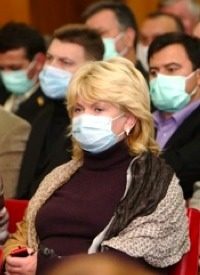
Martial law was effectively declared in the Ukraine last week by unpopular President Victor Yushchenko after an outbreak of what health officials described as flu and respiratory infections. The outbreak has reportedly already infected hundreds of thousands of people in the western regions of the country. In response, the office of the President on November 6 floated the idea of postponing the presidential election until May of next year.
Yushchenko claimed that “unlike similar epidemics in other countries, three pathogens of viral infections came to Ukraine at the same time: two of them are seasonal flu and the third is the A/H1N1.” He added that “such a combination of infections due to mutation may produce a new, even more aggressive virus,” that “the A/H1N1 virus is easily mutating,” and that “the virus has become particularly pathogenic.” However, some analysts have suggested the true culprit is in fact a political struggle among diverse factions and politicians vying for power.
Health officials reported on November 5 that 95 people have died of flu and respiratory infections due to the outbreak. So far only about 20 cases of swine flu have reportedly been confirmed in the country of about 40 million people. The World Health Organization (WHO) has stated that it is assuming that the outbreak was caused by the H1N1 swine flu virus. Several nations including Slovakia have all but shut down border crossings with Ukraine in an attempt to contain the infections while the Ukrainian government appeals for international aid.
Ukrainian health officials on November 6 claimed on the ministry’s website that over 800,000 people had been infected with some sort of acute respiratory ailment, and that at least three deaths were linked to the swine flu. Some news reports have claimed the number of confirmed swine flu deaths is actually above 10. But the outbreak is showing signs of easing, according to the Deputy Health Minister.
However, the government still responded with a heavy hand. The “National Security and Defense Council should become the center of decision-making,” said Ukrainian President Yushchenko in a statement, referring to an executive body composed of the President, the Prime Minister, the Minster of Defense, the Foreign Minister, the chief of the security service, and the Minister of the Interior. “Failure to comply with its orders will immediately result in application to the law enforcement authorities…. For not a single moment you will be left alone by the state.”
A quarantine has been imposed on at least nine provinces of the country, while the government announced that all schools would be closed for at least three weeks due to the infections. Large public gatherings, churches, and even movie theaters have been banned temporarily, while the President is urging all citizens to be vaccinated and the criminal prosecution of resisters.
The President is also seeking to use the circumstances in a bid to squash political opposition and prosecute certain government officials for their alleged negligence in allowing citizens to travel and assemble. Though the World Health Organization has praised the draconian measures, many high-ranking Ukrainian officials including the Prime Minister have condemned the fear mongering and accompanying government response.
There is clearly a lot of uncertainty about the current situation in Ukraine, as evidenced by the contradictory news reports and official statements emanating from the country. But as the dust settles, the truth will hopefully rise to the surface. In the mean time, Ukrainian citizens should resist the tyrannical edicts being imposed upon them and demand that the presidential election be held as planned.
Photo: AP Images


